Sessions in MobileFirst Platform Foundation 7.1 Operational Analytics
Theodora Cheng November 29, 2016
MobileFirst_Platform AnalyticsWhen do sessions show up in the MobileFirst Platform Foundation 7.1 Operational Analytics console?
The Analytics server reports sessions on the analytics console as a combined metric of unique HTTP session cookies and tokens issued from the server. So, whenever a new HTTP session is created at the MFP server or a new token is issued, the value in the “sessions” metric box is incremented.
Starting in MFP 7.0, there is the option to configure an MFP app in session dependent mode or independent mode (default). Please see the documentation regarding this configuration here.
In this blogpost, we will be exploring the various topics:
- How to Get Sessions in Independent Mode
- How to Get Sessions in Dependent Mode
- How to Get Sessions Using Custom Analytics
How to Get Sessions in Independent Mode
In the worklight.properties file, configure the following attributes:
mfp.session.independent=true
mfp.attrStore.type=database
Now if you call WL.Client.connect, your sessions will not increment by 1. This is because in independent mode, session count increases when a protected resource is invoked and an OAuth token is issued from the server. Please see our “Authentication and security” section in our Getting Started Tutorials to see how to protect your application or adapters.
For example, if you create a java adapter “javaAdapter” with the following code in the JavaAdapterResource.java file:
@Path("/users")
public class JavaAdapterResource {
@GET
@Path("/getHello")
public String getHello(){
return "hello";
}
}
Then if you call WLResourceRequest like below, the session count will increase on the first resource request as a new token was issued from the server.
var req = new WLResourceRequest("/adapters/javaAdapter/users/getHello", WLResourceRequest.GET).send();
Session count will not increase again until the token expires, a protected resource is called, and a new token is issued from the server. As you can see in the screenshot below, the session count does not increase with every adapter call.
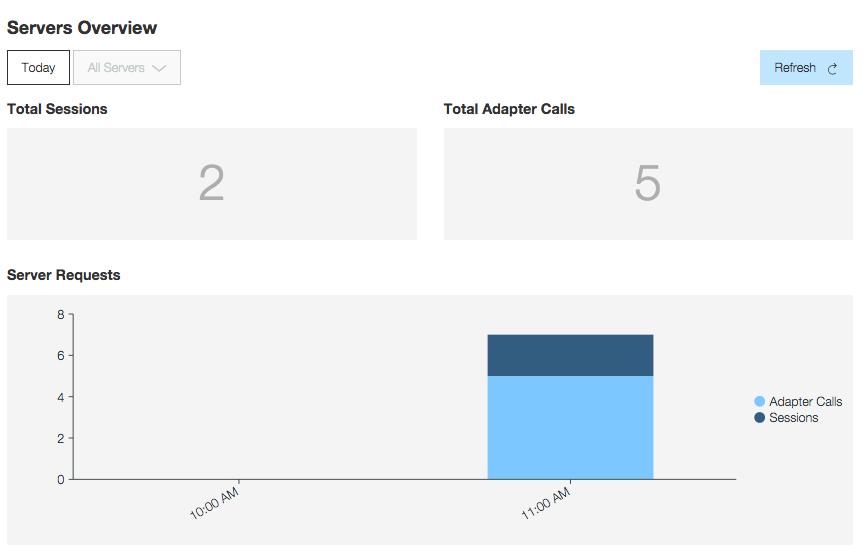
How to Get Sessions in Dependent Mode
In the worklight.properties file, configure the following attributes:
mfp.session.independent=false
mfp.attrStore.type=httpSession
In session dependent mode, the session count will increase every time the server issues an HTTP cookie or OAuth token.
When you call WL.Client.connect, your sessions will increment by 1 like below and a HTTP cookie will be created.
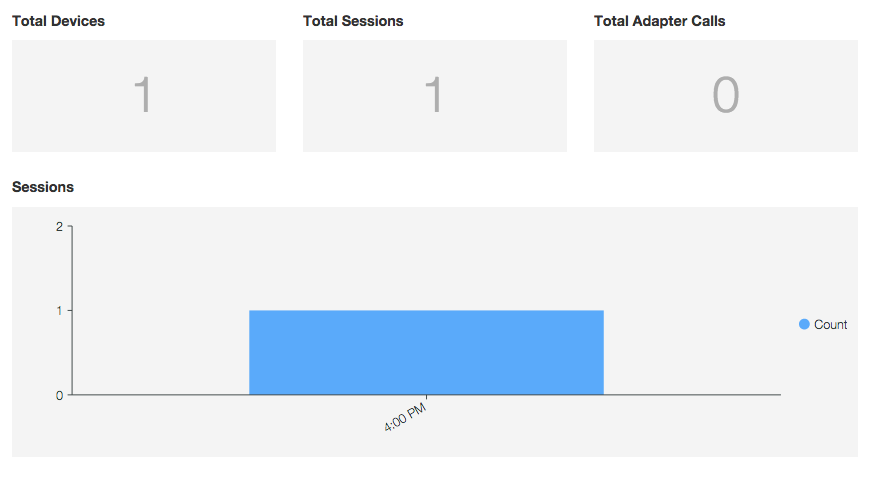
However, it is also important to note that if you have a javascript or java adapter and call WLResourceRequest before the HTTP cookie expires, the session count will also be incremented in the analytics session box and a token will be issued from the server.
For example, if you create an HTTP adapter “testAdapter” with a procedure “testProcedure” and then do a WLResourceRequest like below, the session count will increase on the first resource request as a new token was issued from the server.
var req = new WLResourceRequest("/adapters/testAdapter/testProcedure", WLResourceRequest.GET).send();
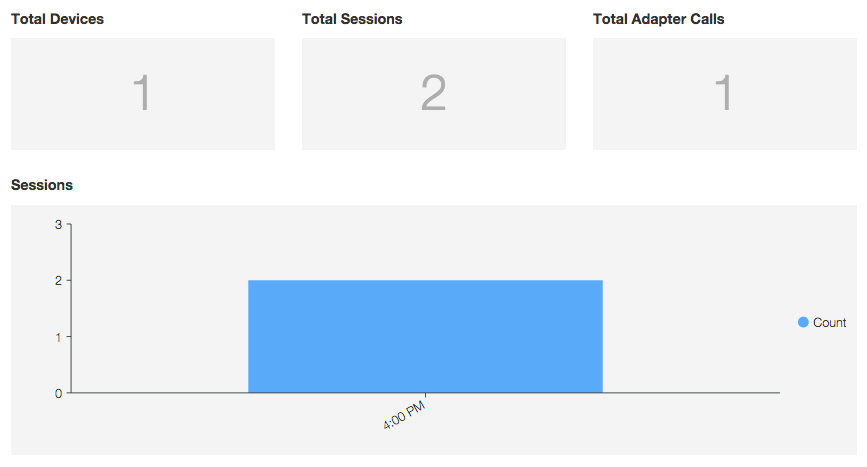
However if you call WLResourceRequest again before the token from the server expires, the session count will not increase.
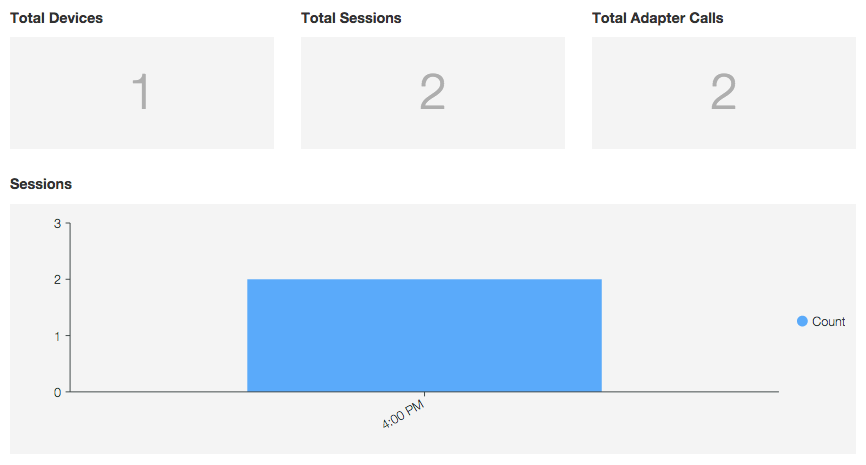
How to Get Sessions Using Custom Analytics
If your organization has a different definition for what a session is, you can also use custom analytics to count sessions. For example, your definition of a session could be every time a user logs into your app.
By placing the following code on the event of a successful log in, you could then create a custom “session” event that logs every time a user successfully logs in. (Following code snippet is for a hybrid app)
WL.Analytics.log({session: "session"}, "successfully logged in");
WL.Analytics.send() //required to send log to the analytics server
Then, if you go to the analytics dashboard, you can create different types of custom charts to view number of sessions.
Total Sessions
Event Type: Custom Data / Chart Type: Metric Group / Measure: Total / Add Filter Property: Session

Session via Timeline
Event Type: Custom Data / Chart Type: Bar Group / X-Axis: Axis By Timeline / Y-Axis: Total /Add Filter Property: Session
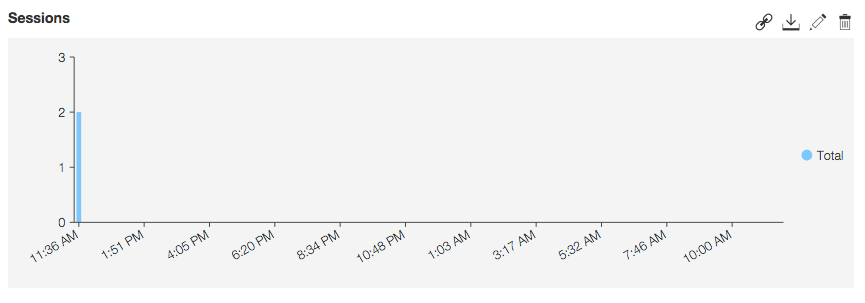
Inclusive terminology note: The Mobile First Platform team is making changes to support the IBM® initiative to replace racially biased and other discriminatory language in our code and content with more inclusive language. While IBM values the use of inclusive language, terms that are outside of IBM's direct influence are sometimes required for the sake of maintaining user understanding. As other industry leaders join IBM in embracing the use of inclusive language, IBM will continue to update the documentation to reflect those changes.




